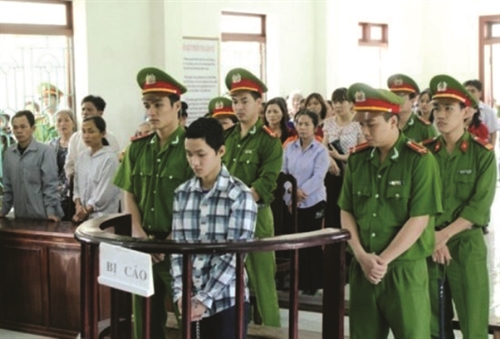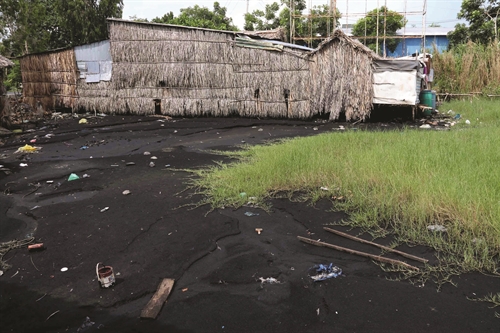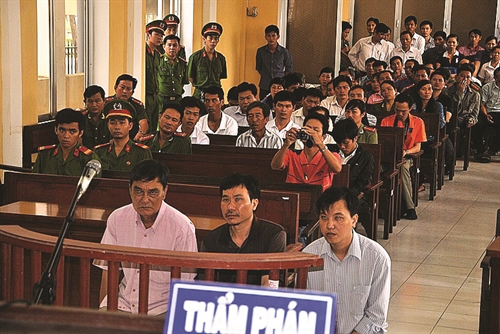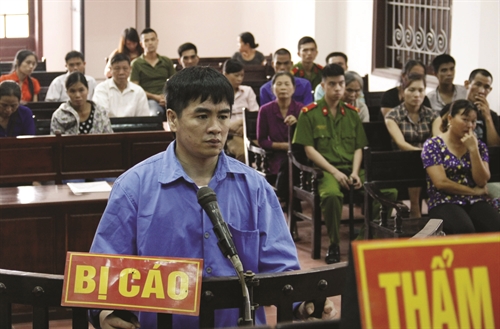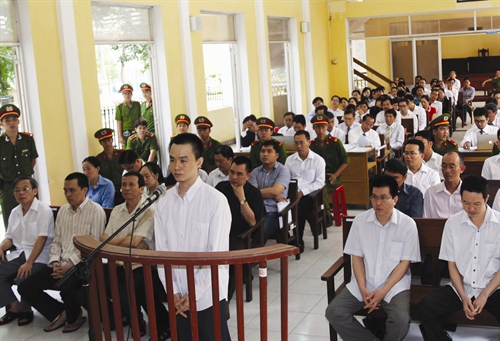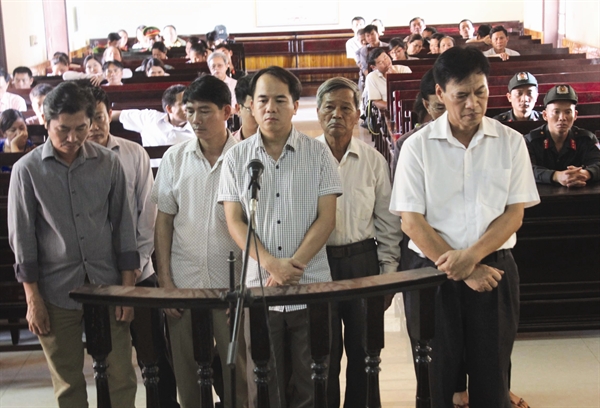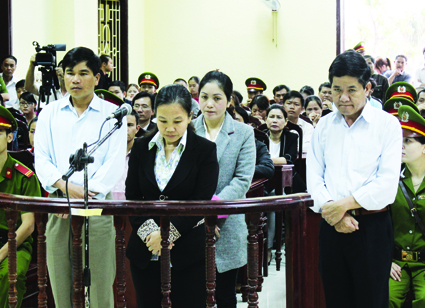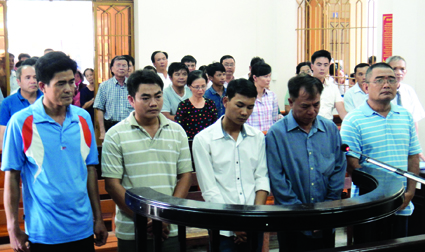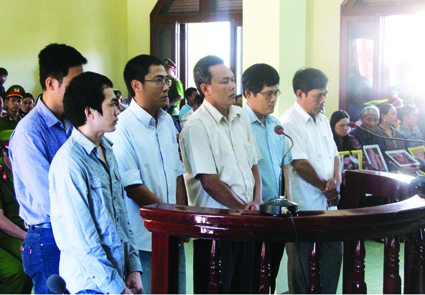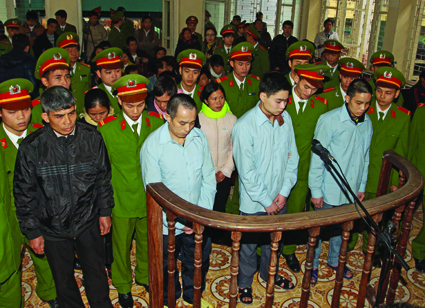>>Criminal liability of juvenile offenders under new Penal Code
>>Penal liability of legal entities under revised Penal Code: an initial analysis
Nguyen Cong Long
National Assembly Office
With 46 articles compared to 35 articles in the 1999 Penal Code, Chapter XVIII on crimes of infringing upon the economic management order is one of the much amended chapters of the 2015 Penal Code. Its amendments aim to implement the judicial reform on criminalizing socially dangerous acts that newly emerge in the socio-economic development and international integration process[1]. These also meet the requirements of making the Penal Code, together with other laws, an effective tool to protect and promote the socialist-oriented market economy, concretizing and guaranteeing the exercise of the rights enshrined in the 2013 Constitution such as human rights and citizens’ rights in the political, civil, economic, cultural and social fields and the right to freedom of enterprise. Below are major new points of this Chapter:
The crime of deliberately acting against the State’s regulations on economic management, causing serious consequences (prescribed in Article 165 of the 1999 Code) is replaced with specific crimes.
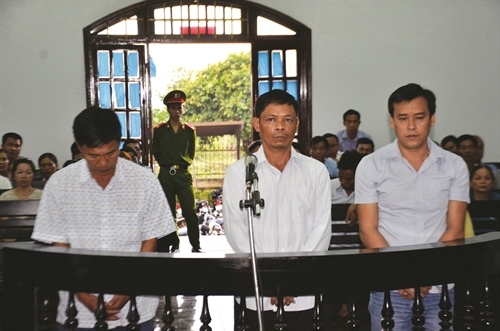 |
| Defendants at the first-intance hearing for their crime of offering and taking bribes in Dak Nong province on January 5__Photo: Ngoc Minh/VNA |
Necessity of the replacement
The 1999 Code still has rather many provisions imbued with characteristics of the old economic mechanism, thus not only limiting the effectiveness of the crime prevention and combat in the new situation but also posing a hindrance to the economic development. Article 165 is a typical one.
Historically, this crime was traced back to Article 12 of the Ordinance on Punishment of Crimes Infringing upon Socialist Property enacted in 1970 by the National Assembly Standing Committee. It was then referred to as the crime of deliberately acting against the economic and financial principles, policies, regimes and regulations, causing damage to socialist property[2]. In the 1985 Penal Code, this crime was established in Article 174. Revised in 1989 and 1999, the basic constituents of the crime remained almost the same, except for several legal terms, damaged property valuation and penalties. Article 165 of the 1999 Code describes this crime as follows:
“Those who abuse their positions and/or powers to deliberately act against the State’s regulations on economic management, causing a loss of between one hundred million dong and under three hundred million dong, or under one hundred million dong, have already been disciplined for such act but repeat their violations thus resulting in serious consequences, shall be subject to non-custodial reform for up to three years or a prison term of between one and five years.”
The heaviest penalty for this crime is 20 years’ imprisonment. Through its practical application over the past years, this Article reveals many inadequacies and has become no longer appropriate to the current economic institutions.
Just referring to “acting against the State’s regulations,” Article 165 fails to describe specific acts constituting the crime. In the old economic system consisting of only two economic sectors, state-run sector and collective sector, operating on a small scale, all economic and financial principles, policies, regimes and regulations were relatively simple. Therefore, the reference to and application of the State’s regulations on economic management in the handling of crimes in these fields were not complicated. Today, the economy is operating in line with the market economy rules with multiple ownership forms and sectors and all business entities are equal to cooperate and compete with one another in a lawful manner. Meanwhile, the legal framework on economic management has become complicated and the management powers have been assigned and decentralized among ministries, sectors and localities. In this context, the use of only one crime to deal with violations in all economic management fields has become inappropriate. For example, Duong Chi Dung, former chairperson of the Board of Directors of the Vinalines Group, was charged of this crime for multiple acts of abusing powers for investment decision, violating bidding regulations and violating accounting regulations, causing particularly serious consequences[3]. Apparently, this has left many criminal acts unpunished, failing to meet the requirements of crime justice in the new situation.
Article 165 has been also applied to punishing almost all criminal acts in the economic fields, if these acts cannot be punished under other articles in the Chapter. This Article can be applied even to acts that have been established as crimes in other articles. A survey of 28 criminal cases settled by October 2015 showed that as many as 40 groups of criminal acts were handled under this Article. Below are three typical groups:
The first group consists of law-breaking acts that cannot and should not be criminalized. They include entering into contracts to gather farm produce for sale to large enterprises by entities that have no legal person status, causing accumulative losses or insolvency by business managers and executives, and signing wrong reward decisions by competent persons. Punishment of these acts under Article 165 was, in essence, the criminalization of civil and economic relations.
The second group covers position-related acts, such as embezzling property and taking bribery, which, for various reasons, procedure-conducting agencies could not prove their self-seeking purpose.
The third group involves those who committed a corruption crime, such as advancing money in contravention of regulations for personal use; withdrawing company funds that are not recorded in accounting books; collecting money amounts from customers without recording in accounting books for personal spending. These offenders could definitely be charged of embezzlement, a crime that carries the maximum penalty of death. But in reality they were convicted “leniently” under Article 165 with the maximum penalty of 20 years in prison.
Moreover, the understanding and application of “the State’s regulations on economic management” are also different among investigation agencies, procuracies and courts. Some agencies hold that the State’s economic regulations must be laws and resolutions of the National Assembly, resolutions of the National Assembly Standing Committee, decrees of the Government, decisions of the Prime Minister, decisions and circulars of economic line ministries on relevant economic fields. Others regard written instructions of competent persons (for example, notices of conclusions of heads of management agencies), regulations of local administrations or even regulations of state economic organizations as the State’s regulations.
It can be said that Article 165 of the 1999 Code is no longer appropriate to the present economic institutions and vulnerable to arbitrary application. It neither meets the requirement of transparency and safety of the investment and business environment nor ensures the effective combat of economic crimes.
Under the 2013 Constitution, citizens can do anything and do business in any field not banned by law. In this spirit, it is necessary to clearly define criminal acts in the economic management and to replace the crime in Article 165 with more specific crimes in different fields.
New crimes added to replace the crime in Article 165
Some lawmakers still recommend keeping Article 165 in the new Code for it is impossible to foresee and enumerate all violations in the economic management and the abrogation of this crime might lead to the omission of some criminal acts. However, based on the new situation’s requirements, opinions of the people and the result of the review of the practical trial of the crime, the new Code finally replaces this crime with nine new crimes in the economic fields.[4]
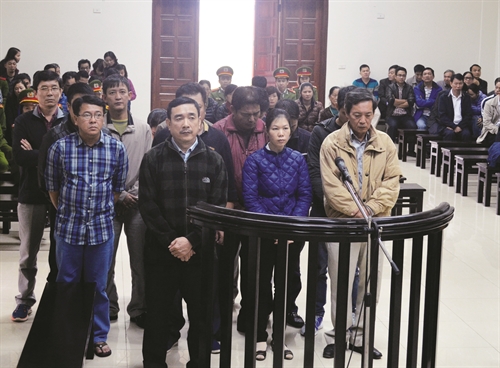 |
| Defendants in a smuggling case at the hearing held by the Quang Ninh province’s People’s Court on January 8__Photo: Nguyen Hoang/VNA |
In principle, all of these new crimes fall into the fields already regulated by specialized laws which prescribe prohibited acts in such fields. For example, Article 16 of the Law on Public Investment specifies 12 groups of prohibited acts; Article 89 of the Bidding Law identifies nine groups; and Article 12 of the Construction Law points to 14 groups. The chapter on crimes infringing upon the economic management order and the above articles of specialized laws are uniform provisions for clearly determining the prohibitions that entities operating in such fields must not commit and imposing penalties for their violations. For example, Article 217 on the crime of violating regulations on competition will be applied to handle violations of the Competition Law. Article 218 on the crime of violating regulations on property auction will be applied to deal with violations in property auction in accordance with the Civil Code and the Law on Execution of Criminal Judgments. Article 220 on the crime of violating regulations on management and use of public investment capital, causing serious consequences, will be used to handle violations of the Law on Public Investment. Article 221 on the crime of violating regulations on accounting, causing serious consequences, will be applied to handle violations of the Accounting Law, etc.
Although these articles are similar to Article 165 in having no specific description of criminal acts, “the State’s regulations” are now clearly defined to be provisions of relevant specialized laws which procedure-conducting agencies should base themselves on to prove criminal acts. This will put an end to the application of sub-laws or regulations of local administrations or economic organizations as grounds for criminalization. The articles on the new nine crimes might not anticipate all possible violations in all fields of economic management. Yet, the replacement of the crime in Article 165 with the new crimes has reaffirmed the principle of criminalization that only violations in law-prescribed fields can be criminally handled and a crime in a certain field may only be handled with the law regulating such field.
In addition to the foresaid new crimes, Chapter XVIII of the Code contains some other notable new points:
The crimes of making false reports on economic management; breaching the regulations on the granting of industrial property protection deeds; and illegally using reserve funds for supplementation to the charter capital of credit institutions prescribed in Articles 167, 170 and 178 of the 1999 Code are abrogated as they are no longer appropriate to the present economic mechanism. The abrogation of these crimes also aims to ensure the conformity of the Code with other relevant laws such as the Law on Statistics, Law on Intellectual Property and Law on Credit Institutions.
Together with new provisions on the penal liability of legal persons for 22 out of 46 crimes prescribed in Chapter XVIII, the constituents of almost all of these crimes have been substantially changed:
- The death penalty is retained only for the crime of producing or trading in counterfeit medicines (Article 194), while most of other crimes carry lighter penalties compared to the 1999 Code. For example, smuggling is subject to the maximum penalty of 20 years’ imprisonment (compared to life imprisonment under the 1999 Code). However, much higher fines are imposed for not only less serious crimes but also serious and very serious crimes (subject to maximum 15 years’ imprisonment), for example: a tax-evading person may be fined up to 4.5 billion dong or an smuggling organization may face a fine of up to 15 billion dong.
- Criminal acts constituting crimes of smuggling and illegally transporting goods or money across the border are now identified by the spatial factor “the border” as well as “from non-tariff area to the inland and vice versa.” This provision to meet the requirement of the handling of new crimes employing more sophisticated tricks. It is also conformable with the international customs practice.
- To determine the circumstance of “causing serious consequences” in the 1999 Code, all articles in Chapter XVIII and other articles of the Code provide clear quantitative norms such as value, quantity of infringing goods, number of dead persons, level of human body injury caused by criminal acts.
- Basic constituents of a number of crimes are changed to be conformable with the specialized laws and present market rules. Notably, in Article 200 on the crime of tax evasion, all tax-evading acts are identified based on the Law on Tax Administration (the current provisions on this crime do not describe tax-evading acts). Similarly, in addition to an exorbitant interest rate five times higher than the maximum agreed rate prescribed in the Civil Code (20 percent/year), Article 201 on usury in civil transactions requires consideration of other factors such as value of illicit profits, administrative violation or previous conviction.
In the field of securities, the current articles on three crimes of intentionally disclosing untruthful information or hiding truth in securities activities (Article 209), using internal information to trade in securities (Article 210), and manipulating securities prices (Article 211) are revised with clearer provisions on the infringing asset value, higher fines and penal liability of legal persons. The Code also establishes a new crime of forging documents in securities offering or listing dossiers (Article 212) in order to better prevent and handle fraudulent acts in securities activities.
In the field of insurance, in order to effectively prevent and combat acts of appropriating insurance premiums which have become rampant over the recent years without having to apply the articles on crimes infringing upon ownership or position-related crimes, the Code establishes four new crimes, of which three aim to help handle fraudulent acts, including committing frauds in insurance business (Article 214), committing frauds in social or unemployment insurance (Article 215), and committing frauds in health insurance (Article 216). The remaining crime is evading payment of social, health and unemployment insurance premiums for employees (Article 216), aiming to punish employers that are obliged to pay insurance premiums for their employees but commit frauds or employ other tricks to shirk their obligation.
In sum, the amendments in Chapter XVIII of the Code aim to guarantee the exercise of the constitutional rights of individuals and organizations and ensure transparency and safety for businesses in their investment and business activities and enhance the effectiveness of the combat of economic crimes. In this Chapter, only one crime remains subject to the death penalty. Meanwhile, crimes of appropriating or self-seeking nature carry much heavier fines.-
